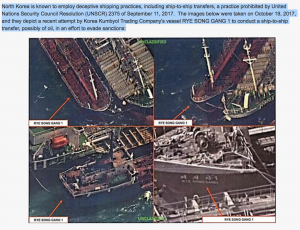By Benjamin Katzeff Silberstein
In response to yesterday’s missile test, Trump has asked Xi Jinping to cease all oil shipments to North Korea from China. “All” presumably includes the crude oil that China ships, in unknown but presumably large amounts, via the pipeline that runs from Northeast China through Dandong and to the Ponghwa refinery in Sinuiju in North Korea’s northeast.
It seems unlikely that China would fully cease shipments of oil to North Korea, especially over a longer term period. Should oil shortages get serious to the degree that vital industries, agriculture and other sectors cannot function properly, China would eventually grow concerned over social instability in North Korea that would risk spilling over its own borders.
Should China cut off crude oil shipments, it would mean that North Korea’s ability to acquire oil and fuel products is severely limited. Sanctions cap the amount that UN member states can ship to the country, and gasoline prices have risen to very high levels during the year. Oil imports through channels that go unnoticed in international trade records are probably much bigger than often estimated. Recall Ri Jong-ho’s famed estimate that North Korea purchases 300,000 tons of oil products each year from Russia. Overall, it is not entirely unfeasible that Russia could grow as a source of North Korean oil imports in the future. North Korea also has some capacity to transform domestically sourced coal products into synthetic liquid fuel.
The drastically increased fuel prices in North Korea during the year also suggest that the state may have been grabbing much of what fuel has been available for its own needs, likely to store for military and other uses, suggesting that North Korean strategists have long seen an oil embargo on the horizon. After all, the markets only exist at the mercy of the state, and will always come secondary. Therefore, we don’t know whether military and state storage might currently be larger than estimated in normal times.
At the end of the day, however, should crude oil flows from China be cut off entirely, there’s no denying it would be problematic for North Korea. Though China is unlikely to entirely cut off all crude oil shipments for a prolonged, long-term period, much pain can be caused in the meantime.
For more on this, I wrote about North Korea’s connections to, and reliance on, China in matters such as infrastructure, energy, and telecommunications earlier this year in IHS Jane’s Intelligence Review.

